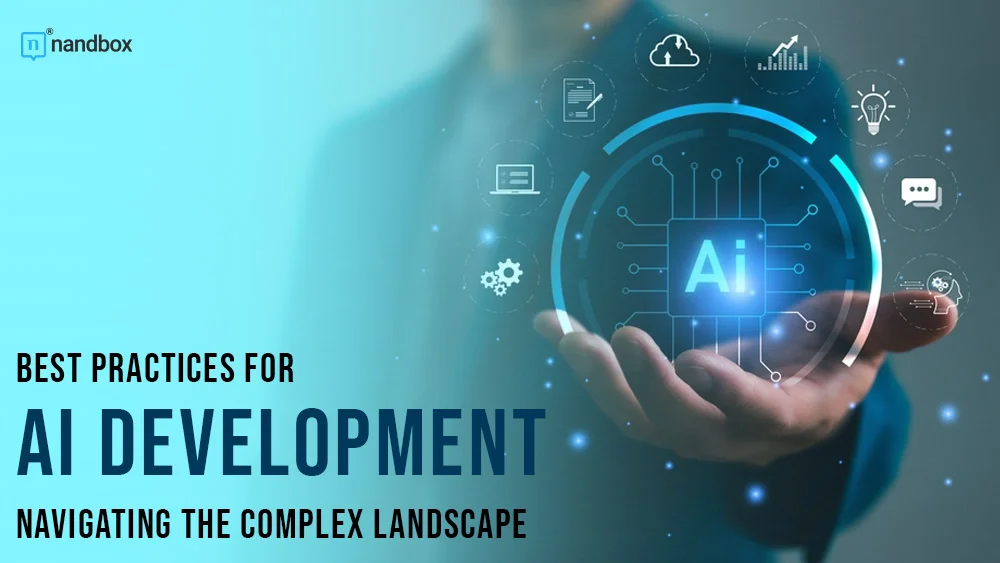Remain Ahead of the Curve With Cutting-Edge AI Advancement Services

Recognizing the Duty of AI in Service

The Current Trends in AI Advancement
Expert System (AI) development is continuously progressing, with brand-new trends shaping the future of this modern technology. Among the current fads in AI growth is the usage of equipment learning techniques to improve automation and decision-making procedures. Artificial intelligence algorithms are being utilized to examine substantial quantities of information, enabling services to obtain valuable insights and make notified decisions in real-time. One more fad is the assimilation of AI with various other emerging modern technologies, such as the Net of Points (IoT) and blockchain. This assimilation makes it possible for the creation of clever systems that can collect and evaluate data from various sources, leading to improved performance and performance. In addition, there is an expanding concentrate on the moral implications of AI development. As AI comes to be extra independent and innovative, worries regarding liability, predisposition, and privacy arise. Developers are currently putting a greater focus on structure AI systems that are transparent, reasonable, and liable. AI advancement is moving in the direction of edge computer, where AI algorithms are released directly on tools, minimizing the reliance on cloud computer and allowing faster and more reliable decision-making. As AI continues to advance, these patterns will certainly shape the future of this technology, driving innovation and improvement across various sectors.
Leveraging Device Discovering for Competitive Advantage
Leveraging artificial intelligence techniques can supply services with a substantial affordable benefit in today's rapidly developing market. Artificial intelligence is a subset of expert system that makes it possible for systems to instantly improve and find out from experience without being clearly set. By analyzing vast amounts of data, artificial intelligence algorithms can identify patterns, make predictions, and generate valuable understandings that can drive critical decision-making.
One trick benefit of artificial intelligence is its capability to process and evaluate large datasets at range, which can reveal concealed patterns and connections that may not appear to human analysts. This can help organizations recognize client preferences, market trends, and possible chances for growth. By leveraging these insights, firms can make data-driven decisions that enhance their items, solutions, and general customer experience.
Moreover, equipment discovering can likewise be used to automate repetitive tasks and simplify service processes. This can release up useful resources and make it possible for workers to focus on even more tactical and value-added tasks. Device knowing algorithms can automate client service communications, identify fraud, maximize supply chains, and individualize advertising projects.
Additionally, maker discovering can boost operational performance and reduce prices by enhancing source allotment, predicting upkeep needs, and reducing downtime. By leveraging maker learning, firms can gain a competitive side by boosting performance, reducing waste, and optimizing their overall operations.
Checking Out the Applications of All-natural Language Handling
Maker knowing's possibility for driving strategic decision-making and improving operational efficiency prolongs to the field of natural language processing (NLP), which includes the evaluation and understanding of human language by makers. NLP has become a powerful device with a wide range of applications throughout various markets.
One of the key applications of NLP is in belief analysis, where it is used to determine the sentiment shared in text data, her comment is here such as social media messages and consumer reviews. By evaluating the belief, companies can acquire useful understandings into customer fulfillment, brand assumption, and popular opinion.
An additional crucial usage instance of NLP is in language translation. Machine translation has actually made substantial progression in recent years, with versions like Google Translate and Microsoft Translator giving exact translations across several languages. This has actually facilitated worldwide communication and opened brand-new possibilities for businesses to expand their reach.
NLP is likewise being made use of in chatbots and digital assistants to make it possible for even more intuitive and natural interactions with individuals. These AI-powered systems can respond and comprehend to customer queries, aiding to automate client support and boost individual experience.
Furthermore, NLP strategies are made use of in info extraction, text summarization, and question-answering systems, enabling makers to draw out relevant details from disorganized text information and provide succinct and precise solutions to customer queries.
Conquering Obstacles in Executing AI Solutions
Applying AI solutions can be an intricate undertaking that needs conquering different obstacles to ensure successful combination and adoption. generative ai software development. As companies increasingly identify the possible benefits of AI, they encounter obstacles that have to be attended to for efficient implementation
One significant obstacle is the availability and top quality of information. AI algorithms greatly count on huge amounts of high-quality data to discover and make accurate predictions. Several organizations battle to gather, clean, and arrange the needed information for AI implementation. This requires investing in data infrastructure and guaranteeing data personal privacy and safety and my company security.
Another obstacle is the absence of AI competence within organizations. AI growth requires experienced specialists who comprehend the ins and outs of equipment discovering, deep learning, and other AI strategies. Searching for and employing these experts can be costly and hard, specifically as the need for AI skill proceeds to increase.
In addition, moral factors to consider pose obstacles in carrying out AI options. Making sure justness, openness, and accountability in AI systems is important to stop predisposition and discrimination. Organizations must create durable moral structures and guidelines to control using AI and address prospective societal worries.
In addition, integrating AI options into existing systems and workflows can be challenging. It calls for mindful preparation, partnership, and alter management to make sure smooth integration and user adoption (generative ai software development). Resistance to be afraid and transform of job displacement are usual obstacles that require to be resolved through efficient communication and training
Conclusion
By comprehending the function of AI in business and leveraging the newest trends in AI growth, organizations can acquire an affordable advantage. Regardless of challenges in implementing AI options, companies can conquer them to harness the full capacity of AI modern technology.
In this discussion, we will explore the duty of AI in business, the most current trends in AI development, and the possible applications of technologies like machine knowing and all-natural language handling. One of the vital duties of AI in business is in boosting customer experience. Overall, the duty of AI in service is to augment human abilities, drive innovation, and provide services with an affordable edge in today's fast-paced and data-driven globe.
By comprehending the function of AI in business and leveraging the newest trends in AI development, companies can gain an affordable advantage. In view it spite of difficulties in carrying out AI remedies, organizations can overcome them to harness the complete capacity of AI modern technology.